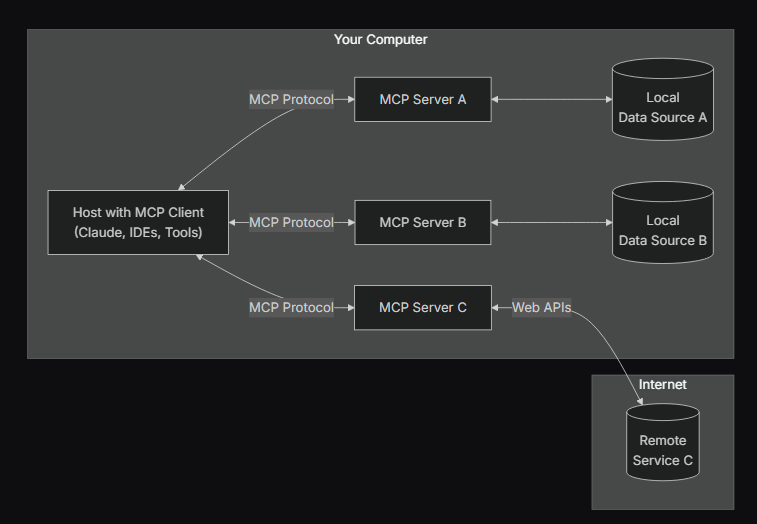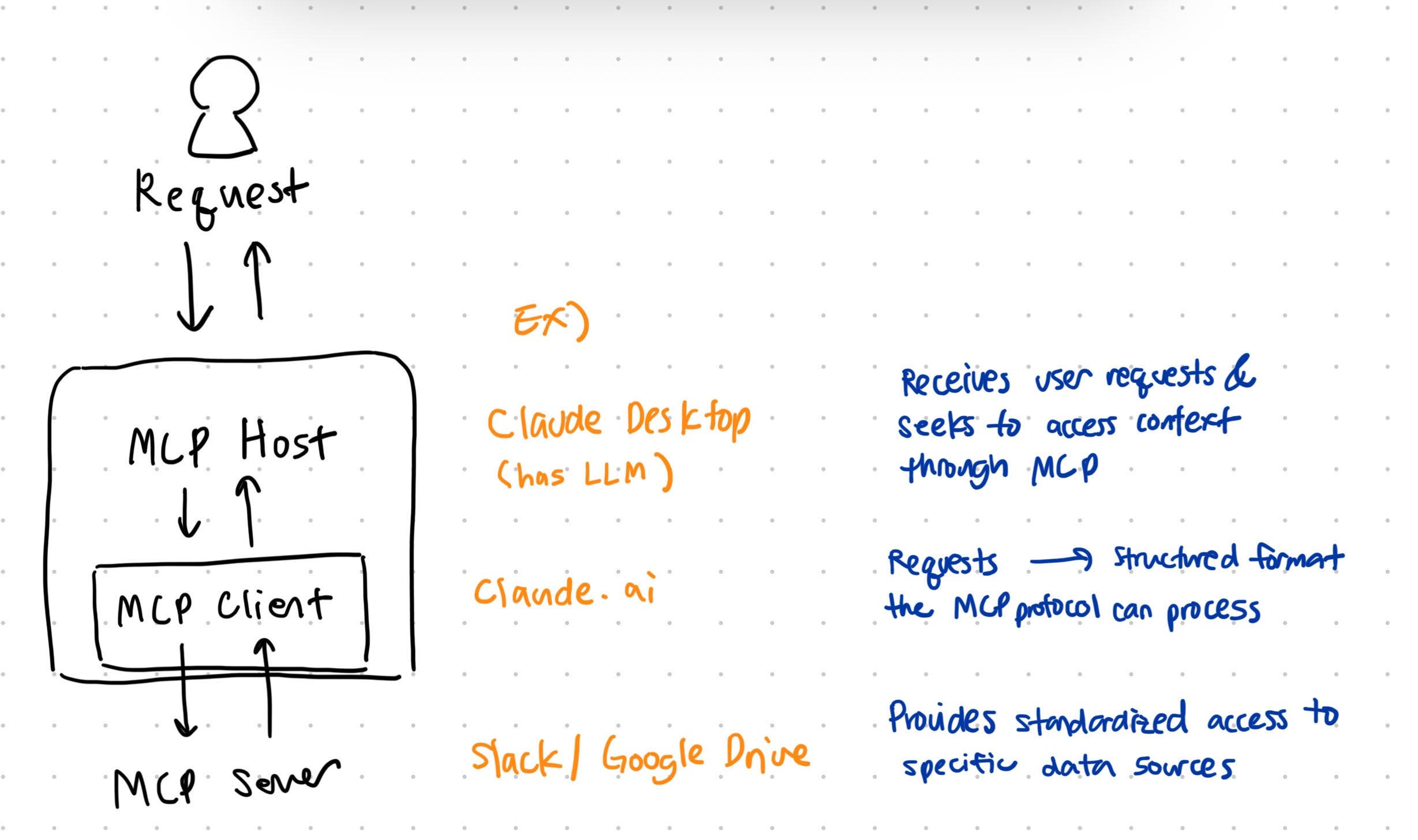Mcp
An open standard developed by Anthropic to enable large language models (LLMs) to interact seamlessly with external tools, systems, and data sources
- Allows access to various external systems (computer files, an API, a browser, or anything else)
- reading files, executing functions, querying databases, and interacting with APIs → makes them more “context aware”
- diagram 1
Transclude of image.avif
- diagram 2

Introduction
- Acts as a “universal translator” or “USB-C port”
- Addresses the fundamental challenge of AI models needing consistent and secure access to necessary information, regardless of location
- The emergence of MCP reflects an important trend of standardization in the AI tool ecosystem
Insights
- A core idea of agentic AI, where LLMs don’t just simply generate text, but has a clear intention to do specific processes/tasks to achieve a goal
- Solves the problem of LLMs of having knowledge limitations
- MCP acts as a perfect way to get access to “updated” knowledge and act actively as an AI agent
- By separating AI models (clients) from data/tool providers (servers), developers can independently develop, update, and scale these components
- a fundamental architectural pattern for building robust enterprise-grade systems
- For example, separate teams can independently develop MCP servers for financial data and CRM data without affecting the core AI application
- a fundamental architectural pattern for building robust enterprise-grade systems
MCP architecture
Fundamentally follows a client-server architecture
- this directly supports modularity and scalability of AI systems

MCP hosts
- An AI application that receives user requests and seeks to access context through MCP - the main application
- Examples
- Claude for desktop, GPT Desktop, Cursor, different LLM applications that can connect to MCPs
- tools that want to access data through MCP
- LLM in here decides if MCP is necessary
- If so, the host uses the MCP client as the orchestrator
MCP client
- Resides within the MCP Host and handles communication between the host and the server
- transforms user requests into a structured format that the MCP protocol can process
- responsible for sending the request to the appropriate MCP server
- session manager
- handling interruptions, timeouts, reconnections, and session terminations
- parses responses, handles errors, and ensures that responses are appropriate for the context
- Protocol clients that maintain 1:1 connections with servers
- client can connect to multiple servers
- Examples
- IBM® BeeAI, Microsoft Copilot Studio, and Claude.ai
MCP server
- just think of them as “plugins”<<
- Provides standardized access to specific data sources (e.g., GitHub repositories, Slack workspaces, AWS services, financial databases
- Resources: File-like data that can be read by clients (like API responses or file contents)
- Tools: Functions that can be called by the LLM (with user approval)
- Prompts: Pre-written templates that help users accomplish specific tasks
Example Interaction Walkthrough
- The user interacts with the MCP host application
- The LLM within the host determines that external data or tools are needed
- The MCP host uses the MCP client to translate this need into a tool call of the MCP protocol
- The MCP client routes the request to the appropriate MCP server
- The MCP server executes the requested tool or retrieves the data
- The MCP server returns the formatted results to the MCP client
- The MCP client passes this result back to the host/LLM to be used in generating the final response
Advantages
- Standardization and Interoperability
- MCP provides a common language for AI to connect with data and tools, enabling seamless interaction between different systems (not tied to specific vendors/technologies)
- Simplified Integration and Reduced Overhead
- eliminates the need to develop custom connectors for every tool and data source
- Enhanced Security and Governance
- Existing security mechanisms (e.g., AWS IAM) can be utilized to apply consistent access control
- Authentication
- Scalability and Configurability
- As MCP is based on a modular design, it supports the construction of scalable AI solutions that align with AWS architecture best practices
- Context-Aware AI
- AI models can utilize richer and more accurate contextual information
Resources
- backend explained - my notes for client vs server, etc
- posts
- list of servers!!
- docs
- quickstart - https://modelcontextprotocol.io/introduction
- for server devs - https://modelcontextprotocol.io/quickstart/server
- cursor + mcp
- 안될공학 - https://youtu.be/Qdu6Sv-NpeU?si=l1LaAWM_R3Tjlg7L
Setting MCP (claude) on my pc
4/24/25
- quickstart tutorial - https://modelcontextprotocol.io/quickstart/user#why-claude-for-desktop-and-not-claude-ai
- actually let it write a poem about snorlax and it did lol

- actually interesting, i want to brainstorm what types of stuff this can do & its potential
- start → building a simple web server tutorial